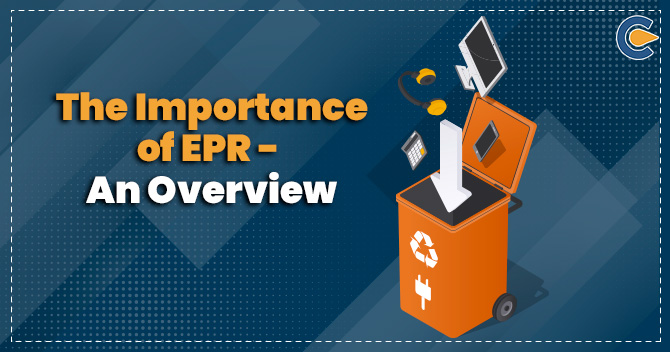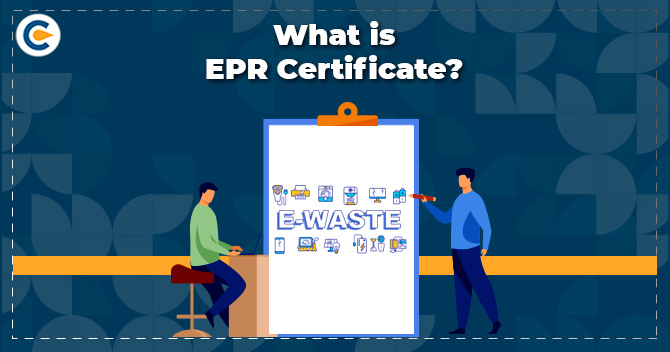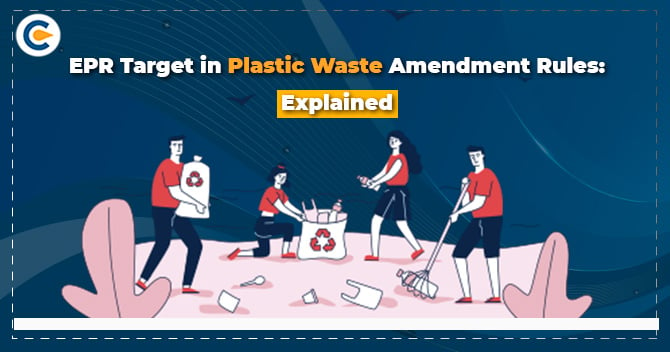To stop the pollution produced from the packaging, we strictly require a circular economy where we exclude what we don’t need, innovate towards new packaging, business & products & business models & circulate all the packaging we do use, keeping it in the economy & out of the environment. But sorting, collection & recycling of packaging usually costs more to do than the money it makes. EPR or Extended Producer Responsibility is the only proven and likely way to facilitate funding that is dedicated, sufficient, and ongoing. Via EPR Scheme, companies putting packaging on the market are required to pay for its collecting, recycling & sorting after use. In this write-up, we will discuss the importance of EPR.
What is EPR?
Before we discuss the importance of EPR, lets understand the meaning of EPR. EPR or Extended Producer Responsibility[1] is a statutory tool used by industrialised countries to encourage & promote the recycling, reuse, and ecologically responsible disposal of electronic & polymer waste. Under Extended Producer Responsibility, it’s the producer’s responsibility to dispose of this garbage. Regulations of EPR exist to make sure that manufacturers & producers are held accountable for decreasing waste generated by their products.
Electric & electronic equipment waste producers, bulk consumers, recyclers, manufacturers, importers, dismantlers, and collection centers are all eligible for an EPR Authorisation.
EPR for e-waste if applicable to the following:
- Electrical and electronic equipment’s bulk user;
- Dismantlers, recyclers, collection centers, and refurbishers;
- Electronic or electric equipment or plastics manufacturer;
- Electrical & electronic equipment’s bulk importer.
What is the Importance of EPR?
EPR or Extended Producer Responsibility is frequently mentioned as a way to combat planned obsolescence since it financially incentivises producers to design for recycling & make goods last longer. Governments may be alleviated the monetary strain of paying for and handling rubbish by shifting some of the cost responsibility to the manufacturer, in addition to combating planned obsolescence.
Once such importance of IPR is that it becomes more effective when countries who export e-waste are required to participate. E-waste regulation induces infrastructure to cope with the garbage or adopt new manufacturing ways. As more countries implement such measures, it becomes more difficult for others to ignore the problems. The garbage stacked up at ports when China banned the import of e-waste from the United States; for instance, the absence of infrastructure for recycling e-waste in the United States has been possible due to the freedom the indifference of export & producer. As a result of the growing e-waste dump, countries are being forced to build infrastructure & governments are being forced to put better rules on enterprises.
Following are the advantages for EPR Registration holders:
- Improved market reputation as an outcome of the company’s dedication to eliminating e-waste;
- Advance e-waste handling coordination with affiliated units;
- Create a reliable image for the global market;
- Access to an inclusive framework that facilitates cost-effective e-waste management.
Applicability of EPR for Plastic Waste – Importance of EPR
Every manufacturer, reuser, recycler, producer, dismantler, and gram panchayat segregator of plastic products or garbage should take an EPR for Plastic Waste Management.
Practically, if a producer sells 100 metric tonnes of polymer packaging, it is accountable for processing & disposing of hundred metric tonnes of post-consumer plastic trash. The PRO or Producer Responsibility Organisation can likewise be tasked with this task (PRO). The producer should pay a PRO for the proper disposal and storage of plastic garbage. The EPR or Extended Producer Responsibility has contributed to the development of unique product and packaging solutions, resulting in less plastic waste because it has transferred a load of waste management from governments to these product creators.
Conclusion
After discussing the importance of EPR, it is concluded that through corporate governance, regulation & the influence of the customer, EPR may have a major impact on how both businesses and the waste industry operate for decades to come. However, it is not a magic pill, and knowing the concept’s pros & cons is vital for sustainable decisions to come.
Read our Article:A Complete Overview on the Benefits of EPR authorization











